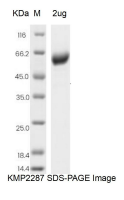Service Line:+86-022-82164980
Address:FL-4, Building A5, International Enterprise Community, Tianjin, China
Email:[email protected]
| Catalog Number | KMP2287 |
|---|---|
| Product Name | Human CD40L Receptor Protein, mFc Tag |
| Product Description | The Human CD40L Receptor Protein(KMP2287) is produced in HEK293 Cells and the target gene encoding Glu21-Arg193 is expressed with a mFc tag at the C-terminus. |
| Molecular Weight | 19.17 kDa |
| Alias | Tumor Necrosis Factor Receptor Superfamily member 5, CD40L |
| Species | Human |
| Host | HEK293 Cells |
| Size | 50ug, 100ug, 200ug |
| Purification | Affinity purification |
| Purity | >95% as determined by SDS-PAGE |
| Endotoxin | <1.0 EU/ug determined by the LAL method |
| Buffer | PBS, pH7.4 |
| Uniprot | P25942 |
| SDS-PAGE |  |
| Function | Receptor for TNFSF5/CD40LG (PubMed:31331973). Transduces TRAF6- and MAP3K8-mediated signals that activate ERK in macrophages and B cells, leading to induction of immunoglobulin secretion (By similarity). |
| Background | CD40 is a Type I Transmembrane Glycoprotein that belongs to the TNF Receptor Superfamily. CD40 is expressed in B cells, follicular dendritic cells, dendritic cells, activated monocytes, macrophages, endothelial cells, vascular smooth muscle cells, and several tumor cell lines. The extracellular domain of CD40 is characterized by Cysteine rich repeat regions. Interaction of CD40 with its ligand(CD40L) leads to aggregation of CD40 molecules, which in turn interact with cytoplasmic components to initiate signaling pathways. Several different TRAF proteins(adaptor proteins) have been identified to serves as mediators of the signal transduction. CD40 plays an essential role in mediating a broad variety of immune and inflammatory responses including T cell-dependent immunoglobulin class switching, memory B cell development, and germinal center formation. |
| Storage | Aliquot and store at -20℃ to -80℃. Avoid repeated freezing and thawing cycles. |
| Note | This product is for research use only. |
| References | J. Immunol. 203:1383-1391 (2019) |